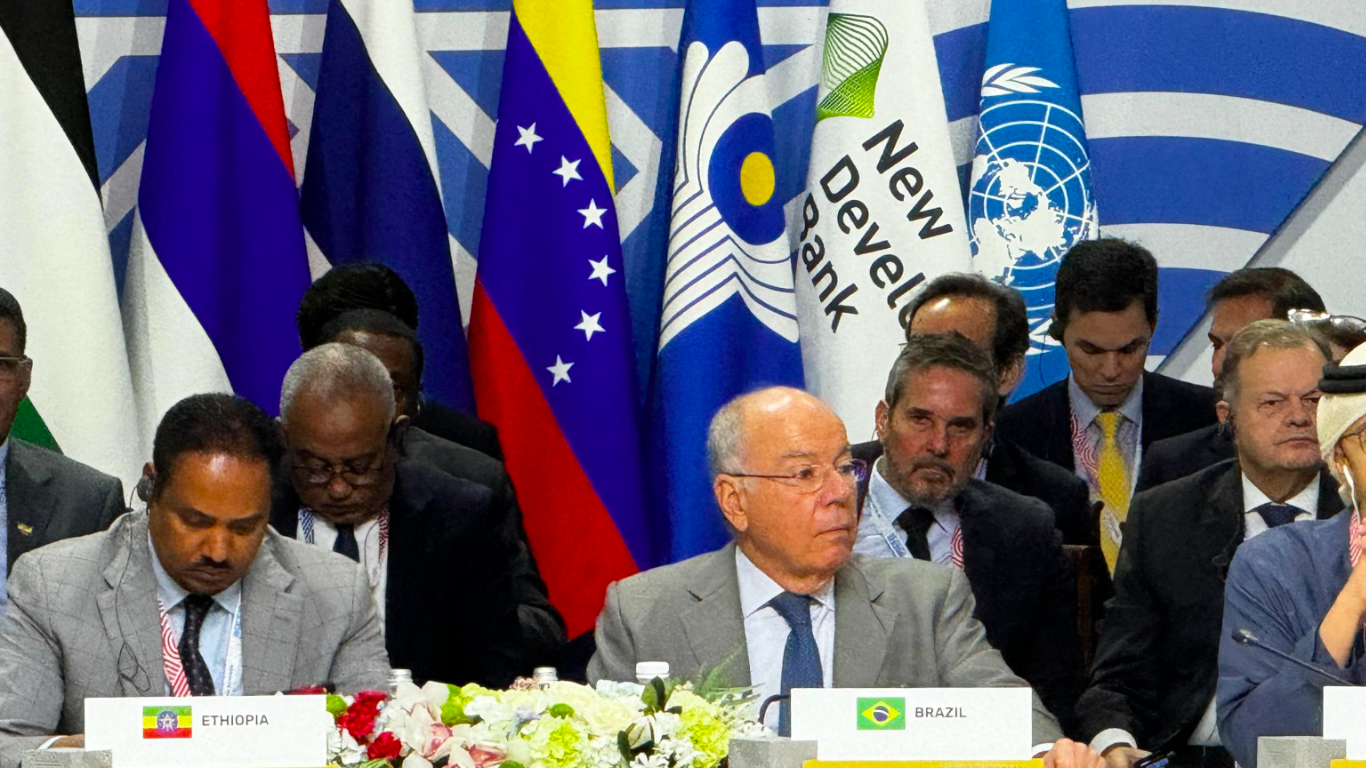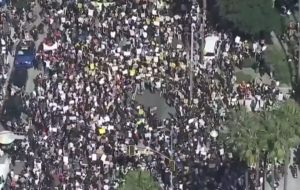
Published 10/25/2024 16:37 | Edited 10/25/2024 17:16
At the Plenary Session of the 16th BRICS Summit in Kazan (Russia), held on October 24, 2024, the Minister of Foreign Affairs of Brazil, Mauro Vieira, spoke with solid and direct rhetoric that sought to reaffirm the values and ambitions of the BRICS in the international scene. At the meeting with representatives from 36 countries, the Brazilian minister expressed criticism of the lack of action by some nations in relation to the humanitarian situation in the Gaza Strip. Vieira praised, in contrast, the stance of countries in the Global South, which have sought mediation in the conflict in the Middle East.
According to the Brazilian chancellor, “it was the countries of the Global South that voted in favor of the UN General Assembly resolution that calls for the cessation of hostilities. Meanwhile, the role played by other countries has been disappointing, to say the least, complicit. Those who claim to be defenders of human rights close their eyes to the greatest atrocity in recent history.” Vieira also criticized the stance of the UN Security Council, saying that the Israeli response to the conflict ended up compromising the integrity of international humanitarian law.
In a global context marked by polarization and the weakening of multilateral institutions, Vieira emphasized the importance of the bloc and the responsibility of its members in building a fairer and more inclusive world order. The tone of the speech highlighted the historic mission of BRICS as heir to struggles for development and peace, while at the same time criticizing the actions of other countries in the face of humanitarian crises and prolonged conflicts.
More bombs than World War II
The mention of the actions of the Arab League, Egypt and Qatar to mitigate the humanitarian crisis in Gaza places the countries of the Global South as protagonists in the search for peace, while the United States is subtly criticized for its veto in the Security Council, preventing resolutions that could alleviate the situation in the Middle East. The Brazilian position, in line with support for the creation of an independent Palestinian State, projects the country as an active voice in the defense of human rights and balanced solutions to international conflicts.
Furthermore, the inclusion of South Africa and Brazil as countries that have taken formal initiatives at the UN in relation to the conflict reinforces the BRICS as a space for alignment on humanitarian causes, without necessarily depending on guidance from the main Western powers. By citing the history of military intervention and the bombings of Gaza, Vieira endorses a speech of indignation that seeks to increase pressure for the international community to review its position on the Israeli-Palestinian conflict.
He stated that “Israel’s disproportionate response has become collective punishment for the Palestinian people,” and highlighted that more explosives were dropped on Gaza than on the cities of Dresden, Hamburg and London during World War II.
Multipolarity and multilateralism: Ukraine, Cuba and unilateral sanctions
Vieira addressed the Ukrainian conflict, highlighting the pacifist approach defended by Brazil and China and reinforcing the role of BRICS as “a peace club” that promotes dialogue and diplomacy to resolve disputes. When mentioning the unilateral sanctions against Cuba, the minister denounced the coercive actions and the blockade situation that has affected the Caribbean country for decades. The criticism is directly connected to Brazil’s principle of opposition to unilateral sanctions, positioning the country on a path contrary to the policy of economic pressure.
This position reinforces BRICS’ call for an international policy that prioritizes dialogue and respect for international law, rather than the use of sanctions. By expressing solidarity with Cuba, Vieira highlights Brazil’s dissatisfaction with coercive approaches and its support for an international relations policy based on the sovereignty and self-determination of peoples.
Climate, inclusion and global governance: Brazilian priorities
In the field of global governance, Vieira highlighted the need to reform international structures, a priority both in the G20 and on the agenda of the Brazilian presidency of the BRICS in 2025. Brazil envisions a review of the UN Charter, which, according to the minister, could make room for a more representative structure that is less susceptible to paralysis. This theme echoes Brazil’s desire to consolidate itself as a leader of the Global South, using its prominent position in the BRICS and the G20 to mobilize efforts for more inclusive international governance.
Finally, Vieira mentioned the possibility of convening a general conference to review the UN charter, in accordance with article 109, which requires the support of two-thirds of the members of the General Assembly and nine votes of the Security Council.
The commitment to the Global Alliance against Hunger and Poverty and to tackling climate change reflects the Brazilian vision that the BRICS must lead a response to contemporary challenges, prioritizing sustainable development and climate justice. On the way to COP30 in Belém, Vieira urges members to increase their Nationally Determined Contributions (NDCs), endorsing an ambitious vision in which BRICS can emerge as a model of climate commitment and energy transition innovation.
A central point of the speech was the reaffirmation that BRICS is intrinsically linked to the values defended by groupings such as the G77 and the Non-Aligned Movement, which were crucial in the construction of a “New International Economic Order” in past decades. Vieira portrayed BRICS as a successor to these movements, now positioned as a protagonist in the search for a more equitable and sustainable world. The mention of the Sustainable Development Goals (SDGs) reinforces the commitment to global goals that aim to eradicate poverty and tackle climate change, positioning the bloc as an agent of change capable of attracting the interest of other nations in the Global South.
BRICS and the future of global governance
Mauro Vieira’s speech at the BRICS Summit reflects a robust vision of a Brazil committed to redefining its international role and strengthening BRICS as a protagonist of the multipolar order. Criticism of the behavior of major Western powers and the call for solidarity and cooperation between countries in the Global South suggest that Brazil is engaged in leading a new phase of international diplomacy.
By emphasizing issues such as the climate crisis, global governance reforms and peace, Brazil projects the BRICS as an alternative and constructive space, capable of dialoguing with established powers, but determined to defend an independent agenda oriented towards inclusive development and sustainable.
First day: consensus and block expansion
Minister Mauro Vieira held a press conference at the end of the first day of the BRICS Summit, addressing relevant topics such as the group’s expansion, global governance issues, international conflicts and Brazil’s role in the multilateral scenario.
Regarding the war in Ukrainethe minister highlighted that the summit’s final document reflects a consensus among member countries. Vieira mentioned the Sino-Brazilian initiative, promoted during the last UN General Assembly, which aims to foster a space for negotiation and cease hostilities in Eastern Europe. The initiative was described as an “open platform” for new countries, reinforcing the coalition’s mediation role.
A central issue at the summit was the BRICS expansionwhich recently grew from five to ten members. Vieira commented that the inclusion of new countries will be governed by criteria discussed in Kazan, including adherence to the principles of global governance and multilateralism. According to the minister, a list of potential members will still be formalized and debated, with consultations led by the Russian presidency.
When asked about possible applications, such as that of VenezuelaVieira clarified that the BRICS group will follow the principle of consensus, which requires the support of the ten current members before new partners join. He stressed that Brazil remains committed to a moderate and responsible expansion, ensuring that the BRICS remains an efficient and agile platform, without excessive expansion.
Asked about Brazilian positions in the face of conflicts in the Middle EastMauro Vieira reiterated the country’s commitment to diplomatic dialogue, ruling out a possible rupture of diplomatic relations, even in situations of extreme violence, as is currently occurring in Palestine. He emphasized that breaking diplomatic relations aggravates regional tensions and, therefore, is not among the options discussed by the Brazilian government.
The minister also refuted the idea that technological and defense dependence on Israel influences Brazil’s stance. “There are alternatives for this”, stated Vieira, reinforcing that Brazil’s position is based on diplomatic and humanitarian values.
Regarding the perception of a possible disengagement of Brazil at the BRICS meetings, the minister was emphatic in reaffirming the importance of the bloc for Brazilian foreign policy. He highlighted that the presence of a robust Brazilian delegation demonstrates the country’s commitment to BRICS, a “platform for economic cooperation and development” that, according to Vieira, serves as an instrument to promote common interests among developing countries.
Next year, during the Brazilian presidency of the BRICS, priority themes will be the reform of international institutions and the creation of a payment system between members, which allows the use of local currencies, reducing costs and exchange rate dependencies.
In his final observations, Minister Vieira defended the global governance reform. Brazil, like other BRICS countries, considers it a priority to democratize international financial institutions, such as the IMF and the World Bank, to increase the representation of developing countries. He highlighted the importance of preventing entire continents from being underrepresented in these institutions and criticized the current power imbalance, which favors some developed countries to the detriment of emerging economies.
Vieira pointed out that the growing membership of BRICS countries reflects a common interest among nations in the Global South in promoting the convergence and synergy of their economic and political interests. He described BRICS as a bloc that is not “against anyone”, but rather in favor of the development of member countries. The minister also highlighted that the convergence of interests seen at yesterday’s summit is an important indicator of the group’s potential to drive changes in the world order.
The BRICS Summit in Kazan, which continues for two more days, is expected to define other central aspects for the economic and social development of the nations involved, focusing on themes of technological innovation and sustainability.
Watch Minister Mauro Vieira’s speech and then the press conference:
Source: vermelho.org.br

